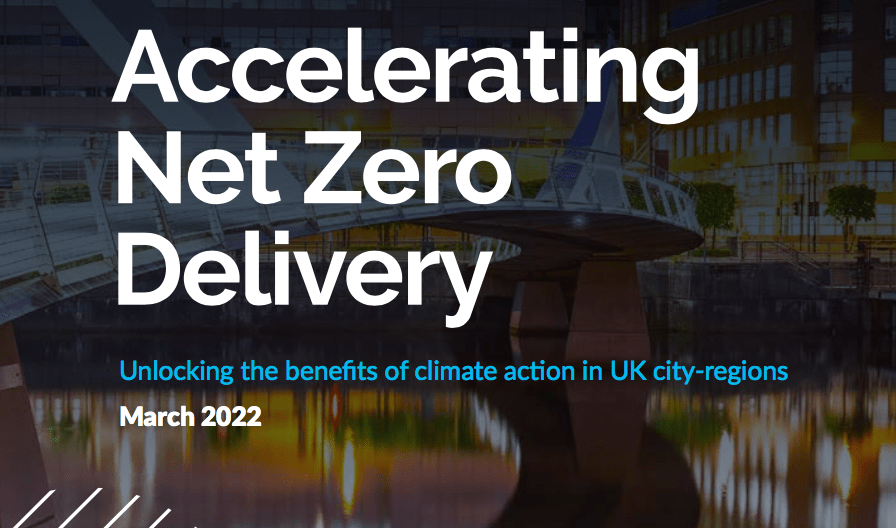New research by PwC has found that ‘place-based’ carbon reduction measures led by UK cities and towns would produce far better environmental, economic and social results, at lower cost, than a national ‘one size fits all’ approach.
The report, Accelerating Net Zero Delivery: Unlocking the benefits of climate action in UK city-regions, describes the findings of the research commissioned by Innovate UK and carried out by PwC with Otley Energy and the University of Leeds.
The study uses leading edge economic modelling, focusing on six city-regions with different characteristics. It compares the costs and benefits of a ‘place-specific’ approach compared to a ‘place-agnostic’ approach when delivering low-carbon measures and projects in the buildings and transport sectors.
It shows that when city‑regions are able to adopt the most socially cost-effective combination of low-carbon measures based on local characteristics, needs and opportunities, far less investment is needed, while creating nearly double the energy savings and social benefit.
With a place-agnostic approach it would take £195 billion of investment in things like heat pumps, insulation and electric vehicles, to meet the targets set out in the Sixth Carbon Budget, releasing £57 billion of energy savings, and £444 billion of wider social benefits over the next 30 years.
By contrast, under a scenario taking a place-specific approach, just £58 billion of investment would be needed to meet the same targets – in the process generating £108 billion of energy savings for consumers, and £825 billion of wider social benefits over the next 30 years.
The research studied the costs and benefits of adopting differing mixes of low carbon measures in six city-regions across the UK: Belfast, Cambridgeshire & Peterborough, Glasgow, Greater Manchester, Liverpool and Swansea Bay.
A wide range of low-carbon measures were analysed including electrification of transport and freight; local and district heating networks; building insulation and energy efficiency, and promoting cycling and walking.
A place-based approach could mean, for example, a city with mostly Victorian building stock prioritising measures to improve glazing and insulation; or an urban area with high traffic levels focusing on active or public travel measures that improve air quality as well as carbon reduction.
However, the report finds that there are significant barriers in the way of effective place-based approaches to realise these benefits. It calls for a new delivery framework to co-ordinate local delivery with national policy, taking a whole-systems approach.
Such a framework would include: a revised governance model; consistent portfolio design and management approaches; refreshed funding and finance instruments; and targeted development of skills and capacity.
The report includes recommendations for national and local government, businesses and investors. They include:
- Central government to give devolved and local government a clear mandate for local net zero delivery where aligned to their responsibilities in housing, building and local transport, and to design and implement a national delivery framework that supports enhanced local net zero action as part of a whole-system approach
- Local government to take accountability for net zero portfolios for buildings and transport, identify the most appropriate measures to take for each place, and co-ordinate with local businesses and communities to prioritise opportunities
- Businesses to engage with local low-carbon planning and portfolios, and develop business models, products, services, skills and financing solutions that can deliver local objectives
- Investors to engage with government on investment priorities and strategies, and investigate local net zero financing opportunities.
Speaking at a pre-publication event, Lord Callanan, Minister for Minister for Business, Energy and Corporate Responsibility, said: “Today’s research provides some useful insights into how national and local government can work together to achieve Net Zero.
“It’s particularly significant because this is the first time that social and economic benefits of place-based net zero delivery have been modelled. I know that this novel research will not only be of interest to policymakers but to planners, businesses, communities, and to investors.”
Rob Saunders, director of UKRI’s Prospering from the Energy Revolution programme at Innovate UK, said: “Building on the Government’s Net Zero Strategy, this study presents the missing piece of the puzzle for accelerating net zero delivery in UK city-regions.
“It makes a powerful economic case for localised approaches and supports government planning for how place-based delivery could work – potentially enabling projects worth billions of pounds to bring better net zero lives for residents across the UK.”
Dan Dowling, Partner at PwC UK, said: “Our research highlights the powerful economic case for local climate action. The built environment offers the biggest untapped opportunity to realise the UK’s net zero ambition, and it is clear from this study that a place-based approach will bring better results for both communities and the economy at a lower cost.”
Image: ukri.org











